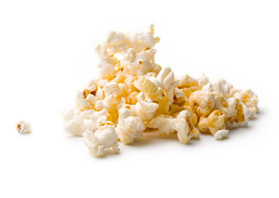Goodbye Solo: North Carolina Strawberry Smoothie Recipe
Year Released: 2009
Directed by: Ramin Bahrani
Starring: Souleymane Sy Savane, Red West, Diana Franco Galindo
(R, 91 min.)

"Am I my brother’s keeper?" Genesis
Here’s a film you probably never heard of and wouldn’t go see on your own. I have, and my advice to you is to stay home and leave it that way.
Since that recommendation doesn’t really get us anywhere, you can see why this review almost didn’t get written. Of course, my original intention was to go see this highly lauded but little known gem and alert my readers to it. It didn’t exactly work out that way.
That’s because Goodbye Solo is an intriguing but ultimately disappointing film. Since I am apparently in the minority here – 95% of the Rotten Tomatoes critics gave it a positive rating –I’ve decided to explain myself and perhaps offer some analysis of the current state of movie criticism along the way.
The film is about the unlikely friendship of two men, Solo (Souleymane Sy Savane) an young, irrepressibly optimistic Senegalese cab driver, and an older man, William (Red West), a regular customer who seems walled off in his inner world of despair. When William sells his condo, closes his band account, and arranges for Solo to drive him to a rocky cliff some two hours away, Solo expects the worst. In the handful of days left before the trip, Solo does all he can find out the source of William’s anguish and tries to talk him out of the one way trip to oblivion.
In may ways, this plot is not unlike Frank Capra’s well loved masterpiece, It’s a Wonderfu Life, where a despondent George Bailey is brought back from the edge of suicide by Clarence, the somewhat bumbling angel sent to rescue him. Critics at Rotten Tomatoes have given this Jimmy Stewart film a 92% positive rating, three points behind Goobye Solo. Perhaps a comparison of the two films can highlight the postmodern deconstruction that has become the lifeblood of the modern film critic.
The familiar pattern of Capra’s film, and so many other wonderful ones like it from that Golden Age of Motion Pictures, was adversity, despair, and life. The modern critically acclaimed equivalent as evidenced by Goodbye Solo is despair, resignation, and death.
In Capra’s film there are very clear reasons for George Bailey’s despair. George Bailey has always chosen duty over pleasure, cancelling going off to college or his trip around the world when the family’s Bedford Savings and Loan needs him. He copes with this self-sacrifice ably until his absentminded Uncle Billy misplaces an $8,000 deposit and the bank is about to go under, with Bailey facing scandal and possible imprisonment. But his thoughts of suicide are not only from despair, but from the notion that he is worth more dead than alive, that his death insurance will save the bank.
Conversely, in Goobye Solo, we never learn any real details of William’s suicidal thoughts. Solo even takes his daily dosage of pills to a pharmacist to find out if he suffers from a deadly disease, only to find them innocuous over the counter antihistamines and vitamins. (Forget that the scene is amiss on at least two counts: a pharmacist probably wouldn’t or couldn’t identify the drugs, and if William is suicidal, why is he still taking daily vitamins?)
We also learn that William’s wife has left him some 30 years earlier and that the young clerk at the movie theater he frequents may indeed be his grandson. The boy, of course doesn’t know it, and when Solo is on the verge of telling him, he loses his nerve. Beyond that, we really don’t know why William has decided to kill himself and apparently the filmmakers don’t think it necessary to fill in the details. Perhaps they think it is edgy to leave us wondering, or maybe they assume that life for the elderly is obviously so meaningless that it doesn’t require further explanation.
While Souleymane endows his Solo with all the joie de vivre of Clarence’s angel and then some, William is not nearly as likeable as Jimmy Stewart’s George Bailey. In fact, William is more like Lionel Barrymore’s irascible Mr. Potter, rebuffing Solo’s intended kindness verbally and even at one point physically. And sadly, he is also a lot like the morally defeated Tommy Lee Jones’ in No Country for Old Men, the sheriff who hangs up his guns in resignation after encountering a soulless and elusive killer,
I’m all for a little existential anguish, but let’s at least put up a fight against it, as Paul Newman did so exquisitely in Cool Hand Luke, and even Sylvester Stallone in his recent Rambo.
SPOILER ALERT:
In the end, even the ebullient Solo is drawn into the film’s nihilism and William’s contagious despair. He willingly drives William to the 3000- foot precipice as promised, and even as we hope against hope that something will intervene –perhaps Solo’s savvy eight-year-old stepdaughter is our modern Clarence – nothing does. Ultimately, there is neither hope nor change, and death is triumphant.
Death is the celebrity feted by today’s critics instead of life. It is either the ultimate dignity (Clint Eastwood’s Million Dollar Baby), or the ignominious end barely worth noting (Little Miss Sunshine), but it is triumphant. It is not a form of self-sacrifice that has meaning beyond itself, as we used to expect, but a black hole that sucks out all significance from a life that is portrayed as ultimately meaningless.
But don’t let me be the final judge. You might just agree with the majority of critics, or maybe you will fall in with the regular guys who said this about it:
“At the end of the film, the audience members spontaneously turned to total strangers and asked, ”What was this about?’”
“I will question the New York Times reviews from now on.”
“The critics must have felt an immigrant cab driver required a generous review. Maybe they should just tip better.”
—Kathy Borich
Film-Loving Foodie
The locale of Goodbye Solo, Winston Salem, North Carolina, is also where the director Ramin Bahrani was born and raised. As a tribute to him and the film’s locale, I’ve chosen as simple and delicious dish from the North Carolina Strawberry Association.
Fresh strawberries are especially plentiful now, and the cool sweetness of a smoothie is in season 12 months a year.
Enjoy!
North Carolina Strawberry Smoothie
Strawberries are great in smoothies. Here is one recipe:
- 1 cup vanilla yogurt
- 1/2 cup fresh strawberries
- 1/2 banana
- 1/4 cup apple juice
- Toss it all in the blender, blend until smooth.
You do not really need a recipe to make a good smoothie. Experiment with different combinations of fruit, milk products (milk, yogurt, ice cream), juices (apple, orange, cranberry, pineapple...). Add crushed ice for a slushy. If the smoothie is not sweet enough after you blend it, add a little sugar or honey to taste.
Recipe Source: North Carolina Strawberry Association



 Rainy Day Rentals
Rainy Day Rentals